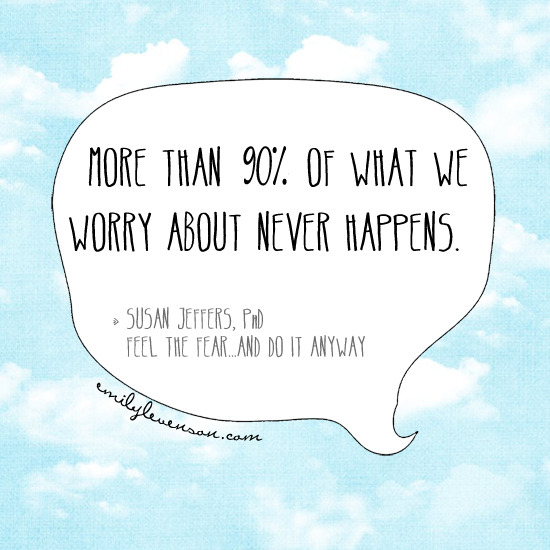
26 Mar Avoiding “What if…?” to Stop Worry
One sure way to start worrying is to ask the question “What if….?”
Our thoughts take us to a dark place, automatically. Worst case scenarios.
It’s how our brains are designed – for survival. We can’t seem to help ourselves, even though we know predicting doom isn’t logical.
Remember that worry serves a purpose: to protect us and keep us physically safe by anticipating everything bad that could happen so we can take some action to avoid it. But life doesn’t work that way.
And so, we worry. We worry about the people and things that matter to us.
- Family and Friends
- Financial Fear
- Health or Illness
- Climate Change
- The State of Education
- Clean Water
- The New Boss or Coworker or Losing My Job
- What Other Countries Are Thinking or Going To Do
- Traffic and Construction
- Being Late
- Being Liked
- What I Saw on Facebook or Instagram or Twitter
- What’s For Dinner?
You probably have your own Top 5, 10 or 20 playlist that’s on repeat at 2:30 AM, and you think…this is CRAZY! How do I make it STOP?
By the way, I have a personal rule to share:
I NEVER believe what I tell myself or what I feel between 1 and 4 AM. Because those thoughts are rarely true or real, and often quite dark. The feelings? Magnified times ten.
Logic doesn’t always help, because the “primitive” part of the brain is designed to hijack and override the “thinking” part of our brain. By design. But we can learn to work with worry and fear, to manage and accept them.
Tips You Can Use Today
What you can do when worry shows up as an unwelcome guest….
- Take 3 Breaths. (Yes. All my tips start with this one – simple & sweet – calms the fight/flight/freeze response in your body when done correctly.)
- Remember that thoughts are just thoughts, and that you do have some control over them. They will usually pass if you don’t feed them and don’t fight them. Mindfulness techniques work very well here.
For example:
What if … I say something stupid in the meeting tomorrow and everyone thinks I’m an incompetent fool?
(C’mon, you know you’ve thought that about somebody else at some point, too.)
Let yourself go there. Suppose it does happen. Play it out. Fear will lose its power over you.
The worst thing would be everyone looks at me and somebody actually says, “That’s the stupidest thing I’ve ever heard” and everyone laughs maniacally and dogpiles with even more judgment and I’m humiliated and banished from the meetings forever and I get fired.
It’s unlikely to happen that way, but even if it did – you would grieve it, survive it, and regroup, right?
- Play Point/Counterpoint
Sometimes, you can replace worry thoughts with other thoughts.
If I imagine the WORST case, then I choose to counterbalance those thoughts with also entertaining the BEST case scenario.
For example:
What if…I say something that’s not the greatest in the meeting tomorrow and nothing bad actually happens?
OR
What if…I say something useful in the meeting tomorrow and get acknowledged for my contribution?
OR even better
What if…I say something brilliant in the meeting tomorrow and get a promotion and a raise?
(It COULD happen! Own it!)
Use these time-tested tips when you notice you’re thinking “What if…” in order to decrease worry, increase optimism and drop your pulse rate.
If needed, talk with your counselor more about how your thoughts feed feelings and other strategies to better manage worry and anxiety.
Originally published on March 25, 2018 at KeriRiggs.com



